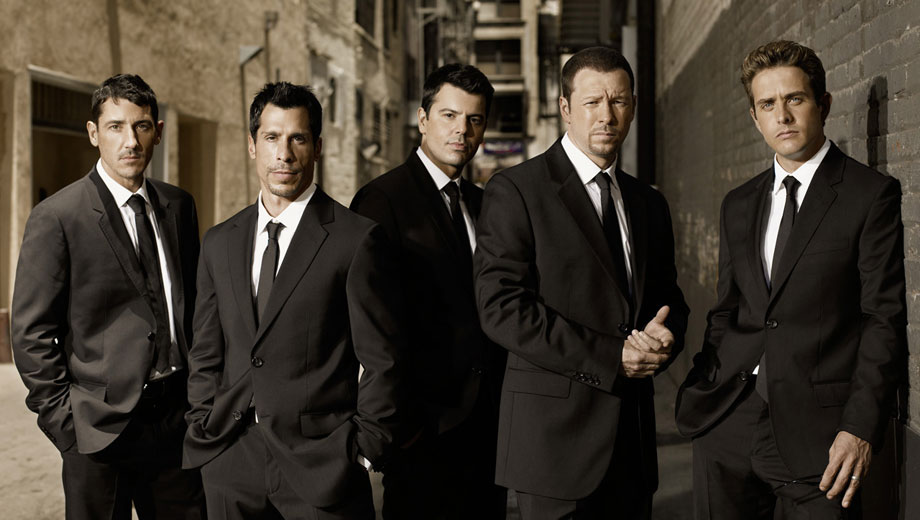
After his success with New Edition, producer Maurice Starr decided to replicate the singing group by substituting suburban white kids for the young black teenagers. The result was New Kids on the Block, a pioneering boy band that eclipsed the popularity of Starr’s previous group while laying the groundwork for the teen pop boom of the late ’90s. During the New Kids’ heyday, the group reportedly earned over one million dollars per week, and their string of hit singles — the bulk of which reinterpreted R&B-styled street music for a young female audience — made them one of the era’s most successful acts. Following a botched attempt to rough up their clean-cut image with 1994’s Face the Music, however, the boys disbanded, only to reconvene 14 years later for a comeback album and supporting tour.
In 1985, Maurice Starr launched a citywide talent search in Boston, where he hoped to assemble an adolescent vocal group. Donnie Wahlberg, Jordan Knight, Jon Knight, Danny Wood, and Joe McIntyre were soon recruited to join, with Starr presiding over the young teenagers as manager, choreographer, songwriter, and producer. A contract with Columbia Records followed, and New Kids on the Block made an awkward, enthusiastic debut with their self-titled album in 1986. At the time, the group’s oldest members were barely 16 years old, while McIntyre was only 12.
Hangin’ Tough For their next album, 1988’s Hangin’ Tough, New Kids on the Block bolstered their neo-bubblegum beginnings with slick, radio-ready pop songs. From the saccharine ballad “I’ll Be Loving You Forever” to the title track’s stab at funk, the album spun off a seemingly endless streak of hits in 1988 and 1989. Five songs entered the Top Ten, and even the group’s Christmas album (released during the height of New Kids mania in late 1989) went double platinum, effectively riding the coattails of Hangin’ Tough up the Billboard charts. In another savvy marketing move, Columbia Records released a single from the group’s previous album, which became a Top Ten hit in 1989 despite being three years old. It helped jump-start sales for the middling debut record, and both Hangin’ Tough and New Kids on the Block climbed to multi-platinum status before the decade’s end.
New Kids mania continued in 1990 with Step by Step, whose title track became the group’s biggest single to date. The album sold three million copies in America — a far cry from Hangin’ Tough’s eight million copies, perhaps, but a remarkable feat nevertheless — and also fared well internationally, moving an additional 16 million units in other parts of the world. The boys supported their release with a Coke-sponsored tour, including 100 dates in the U.S. and additional performances overseas. Meanwhile, they also unveiled an extensive line of licensed merchandise — including dolls, lunch boxes, attire, and bed sheets — that earned the group an additional $400 million in 1991. Coupled with the sheer size of their official fan club, the modest popularity of 1991’s No More Games: The Remix Album, and the amount of calls placed to “the Official NKOTB Hotline” at 1-900-909-5KID, the group’s merchandising efforts made them the highest-paid entertainers of the year, beating out the likes of Michael Jackson and Madonna.
Even so, Step by Step proved to be the group’s last album to enjoy such global success. The New Kids were the subject of an endless number of jokes, including allegations that they hadn’t sung a note during the Hangin’ Tough recording sessions. Furthermore, their teenaged audience was growing up, as signified by the failure of Step by Step’s final single, “Let’s Try It Again,” to break the Top 40. In 1994, they rechristened themselves NKOTB (a move that was intended to distance the then twenty-something singers from their kid-oriented past) and returned with Face the Music, which showed a remarkable degree of musical maturity. The group had grown into a credible urban R&B outfit, eschewing the help of Maurice Starr and writing many of the songs themselves. Face the Music failed to replicate any shred of their previous success, however, and New Kids on the Block acrimoniously parted ways in June 1994.
The Block Various members of the New Kids launched solo careers later in the decade, with Knight scoring a gold-selling record in 1999 and Donnie Wahlberg landing several movie roles. Attempts to reunite the group in the early 2000s proved fruitless; however, the bandmembers surprisingly reconvened in early 2008, announcing their decision to tour in support of a new album. The Block arrived later that year, followed by tour dates in Canada and America. Although critically panned, The Block nevertheless debuted at number two on the Billboard charts and sold 100,000 copies in its first week.
Despite those brisk first-week sales, The Block generated a major hit only in Canada, where “Summertime” peaked at nine on the charts. Even if further smashes were not forthcoming, The Block did re-establish NKOTB as a viable commercial concern, something they took advantage of with a succession of tours, including concert cruises and a co-headlining jaunt with the Backstreet Boys in 2011. More tours followed in 2012 and in 2013, the band returned with a new album called 10.

